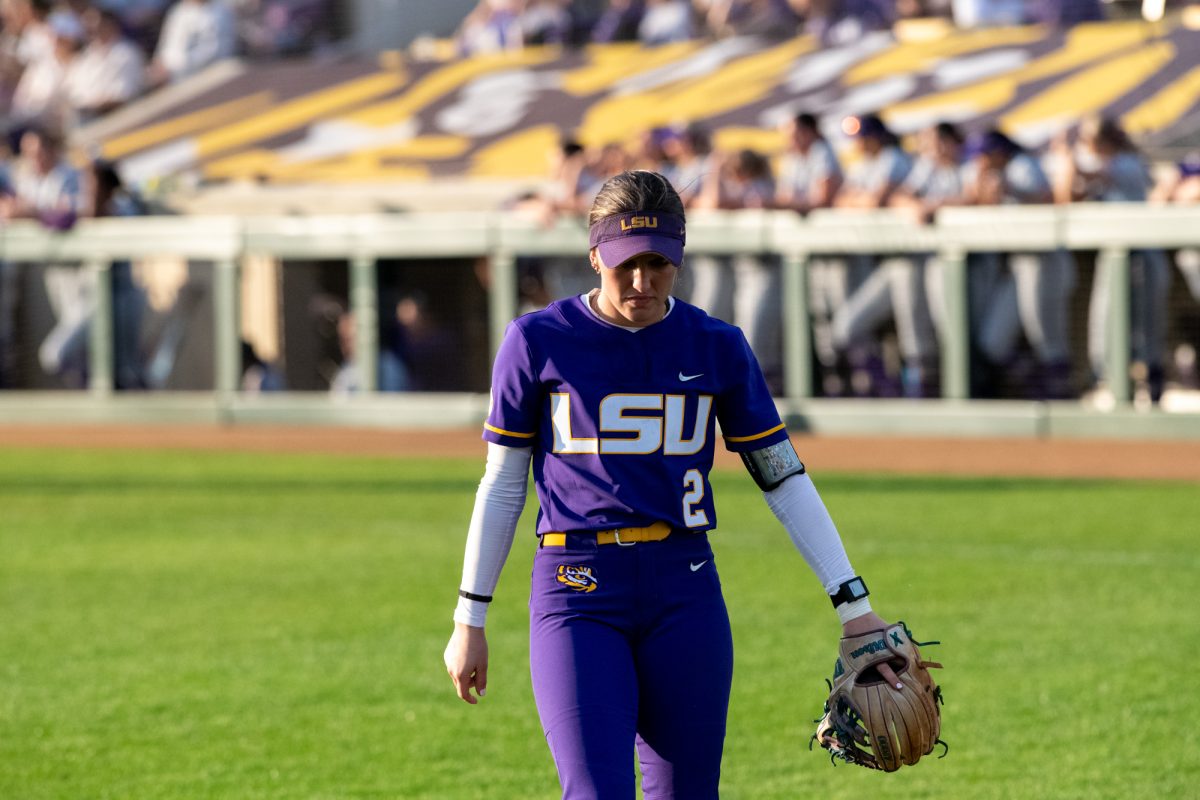A certain phrase greets the LSU football team as it walks into the Football Operations Building and reminds everyone of the team’s dual goals, which coach Les Miles said he constantly emphasizes to his players.”The full measure of success is to graduate and win championships.”LSU coach Les Miles said he constantly pushes the motto with his players.”The highest level of performance on the field is a national championship, but on the same exact line is 100 percent graduation,” Miles said. “We want every guy to get his degree. There will never be a national championship year here where we don’t have success in the classroom.”Since Miles took the coaching reins at LSU in the 2005 season, the average graduation rate on the football team has been 53 percent, with the highest rate in 2009 of 60 percent.Miles did not deny there are challenges in maintaining high graduation numbers from year to year because so many players have their eyes on professional careers.”I told Chad [Jones] after he was drafted … ‘I’m making you come back and get your degree anyway,'” Miles said. “I’d like to have those guys, except if you’re a JaMarcus Russell. He was such a unique situation, the No. 1 position in the NFL draft. The amount of money he made — you just couldn’t improve your position in any way.”Miles’ academic regimen is stringent. He reviews weekly reports on every player, and he instituted a program called “the breakfast club,” in which players report to study at 7 a.m. until their first class. Miles said if they miss class or appointments with tutors, players must show up at 6 a.m. and run for seven minutes followed by either 23 or 53 minutes of studying, depending on their schedules.”My guys hear me say, ‘If you came to LSU just to play football, you made a mistake,'” Miles said.The Academic Progress Rate (APR) is another measure the NCAA takes into account in determining a school’s compliance with academic regulations. The highest possible score is 1,000, and the score is based on the eligibility, retention and graduation of each student athlete on scholarship. Teams that score below 925 on their four-year rate and have a student leave school academically ineligible can lose up to 10 percent of their scholarships through immediate penalties. LSU’s football APR was 923 in 2005 and has risen every year since. The team’s APR score in 2009 was 960, No. 4 in the Southeastern Conference and in the 70th-80th percentile among Division I football programs.Miriam Segar, associate athletic director of student services, said APR may not be the best system to incorporate across all sports at a university.”In all circumstances, it might not be a fair measure in certain sports when student athletes have other opportunities to pursue,” Segar said. “They don’t see the value of staying in school at that time in their lives … Maybe APR is better not looked at as one size fits all.”Bracky Brett, associate athletic director of compliance at Mississippi State, said a challenge with the APR ranking is educating coaches about what it means. Mississippi State’s football APR was 933 in the 2009 report — its highest rating in five years.”The APR is a real-time picture of what’s happening right now,” Brett said. “It’s not all about athletic ability anymore. If you don’t consider the academic side, you run the risk of putting your program into that penalty structure where it costs you even more down the road.”Mississippi State football coach Dan Mullen, who was Urban Meyer’s offensive coordinator at Florida from 2005-08, said he encourages his players to graduate in 3 1/2 years to allow for the opportunity to pursue a professional career with a degree in hand.”We hope they take 15 credits each fall, 15 in the spring and then summer school, which can be 12 credits,” Mullen said. “Hopefully they develop into a great football player and become an All-American, but you never know how that’s going to work out. That degree is going to be with them forever.”Miles also employs the strategy of an accelerated graduation process, and he said it takes persistent training of student-athletes to get them to focus on success in the classroom.”In a sit-down conversation, everyone would realize, ‘Of course I need my degree, of course I need greater skill, of course this all works,'” Miles said. “But does that mean I need to get up at 7 a.m. to study? Does that mean I have to stay up until 1 or 2 a.m. to study? The answer to that question is a tougher one.”Herb Vincent, LSU senior associate athletic director, said though media often solely highlight a team’s athletic success, the football program is “stepping it up” academically.”During the football recruiting process … there’s no discussion in the media and Web sites and message boards if they can excel in the classroom,” Vincent said. “And if a team or student athlete is under-performing, you don’t ever say, ‘Oh well, they’re good on the field.’ We separate the two.”Miles said fostering his student athletes’ potential to succeed academically is a necessity for them to lead productive lives after college.”They need to be able to form opinions, have good thought, be logical and contribute to some company or organization,” Miles said. “The goal is truly when you do exactly what you should do, they should be the national champion and have 100 percent graduation.”
—-Contact Rachel Whittaker at rwhittaker@lsureveille.com
LSU football players’ graduation rates increasing under Miles
May 7, 2010









